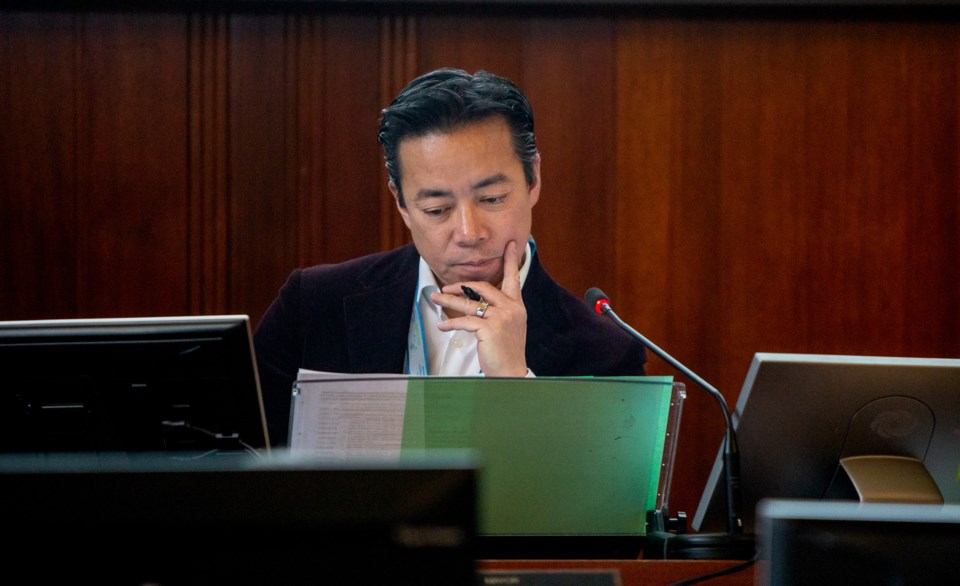Vancouver Mayor Ken Sim announced Thursday that he will bring a motion before council to pause any “net new supportive housing units” in the city until the region’s municipalities build more of the type of housing stock in their communities.
While Vancouver accounts for 25 per cent of Metro Vancouver’s population, the city has more than 77 per cent of the region’s supportive housing units. In addition, more than 67 per cent of the region's operating shelter spaces and over half of the region's social housing is in Vancouver, Sim said.
“This imbalance is unsustainable, especially when much of our existing supportive housing, including our extensive SRO stock, is aging and frankly, falling apart,” the mayor said in a speech to a public safety forum organized by Save Our Streets coalition.
“We can't expect people to rebuild their lives in environments that are crumbling around them. Replacing our aging, temporary, modular, supportive housing with permanent units is a critical first step.”
Sim said pausing construction on supportive housing will give the city time “to make meaningful progress” in replacing aging SRO and temporary modular housing. The focus will be on renewal and revitalization, he said.
That renewal should also include a more diverse housing mix in the Downtown Eastside, which Sim described as the epicentre in B.C. of intersecting crises related to mental illness, poverty and homelessness.
“For too long, multiple levels of government have enabled and encouraged the concentration of supportive housing, shelter spaces and dozens of social service non-profit organizations in this small, four-square-kilometre neighbourhood,” he said.
“This poverty industrial complex has not only blocked local businesses from thriving, but has also created conditions that degrade the health and well-being of our most vulnerable community members.”
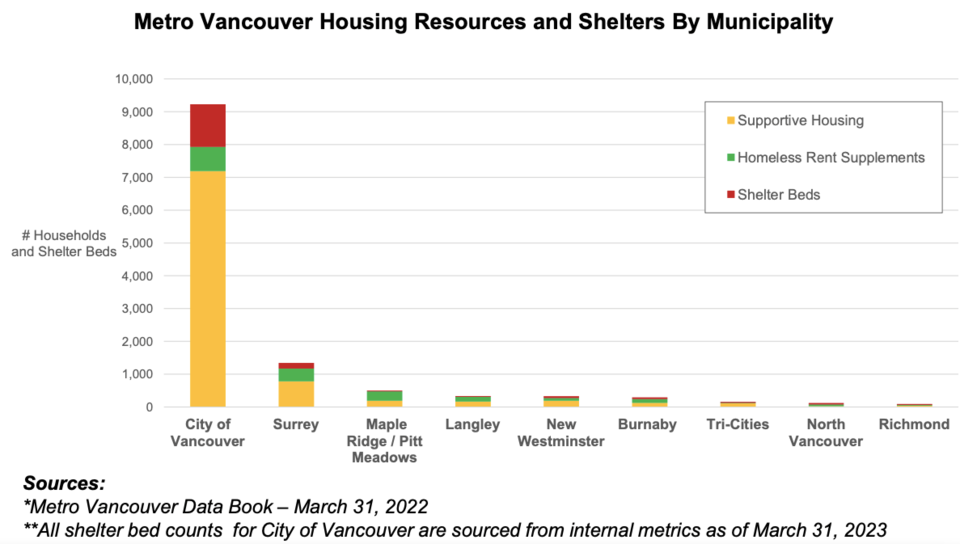
330 supportive housing units in pipeline, 53 under construction
The city’s communications department said in an email Friday that there are five supportive housing projects with a combined 330 units in the pipeline and are in various stages of obtaining a development or building permit.
One additional project with 53 supportive units is also under construction.
“Any changes to the city's supportive housing policies would require council direction,” the city said. “The City of Vancouver has a clear development permit process, and staff will continue to process applications for social and supportive housing according to existing policies until a council resolution is passed.”
The mayor is expected to introduce his motion at a council meeting in February.
Sim’s announcement to pause construction of supportive housing along with amending the Downtown Eastside plan to add more types of housing also included a planned city-wide “crackdown on gangs.”
He said the criminal organizations are preying on the city’s most vulnerable residents, particularly in the Downtown Eastside, where police continue to respond to violent crimes.
“To be clear, this will not be an easy fight, but it's one that's necessary,” Sim said. “We owe it to the residents of the Downtown Eastside and all Vancouverites to ensure that our streets are safe. Gangs have no place in our city. And to them, I say this, ‘Get out of Vancouver.’”
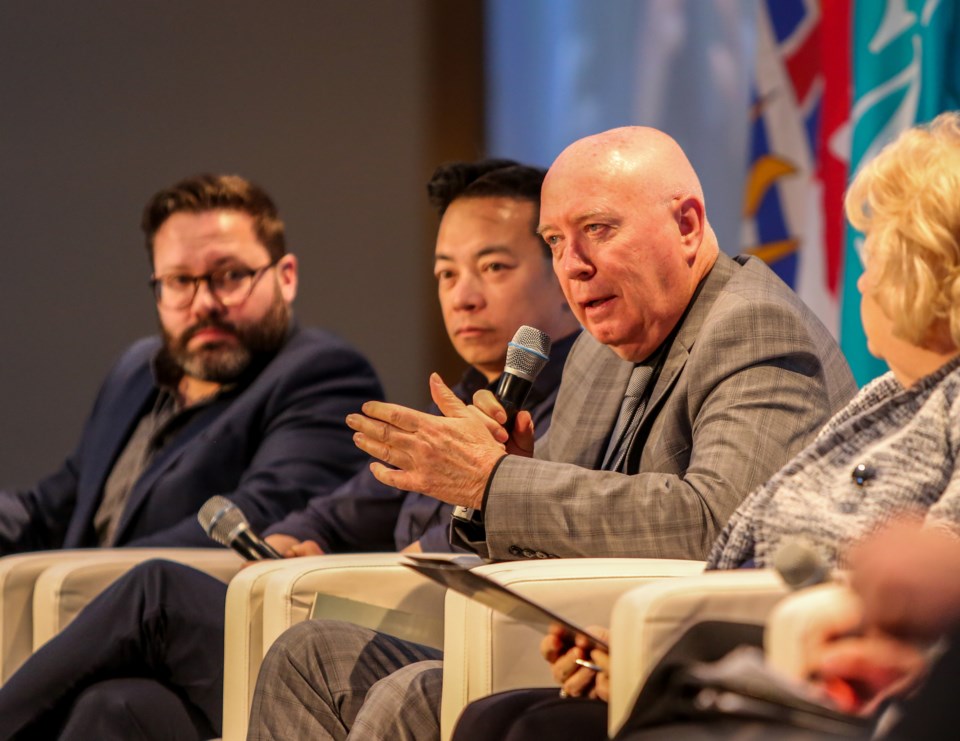
Burnaby
Burnaby Mayor Mike Hurley said his municipality has 200 supportive housing units and wants more. But, Hurley added, the provincial government has to be willing to pay for the housing and additional services needed for tenants who require supports for addictions and mental illness.
“We have never stopped supportive housing from coming to our community,” he said.
“We're not against it. We'd be happy to have more of that type of housing. But at the end of the day, the province and BC Housing have got to be there to do it. And along with that, needs to come the supportive services through Fraser Health that will make that feasible.”
Asked whether Sim’s plan to pause supportive housing will trigger Burnaby to build more, he said: “No, we make our own plans based on our own decisions.”
At the same time, he said Sim’s position is shared by many mayors in the region frustrated with the lack of housing and services for people living with a mental illness, substance addiction, or both.
“In Burnaby, there are very little services for addictions,” Hurley said. “We've hired new people who are experts in the field to go out and speak with the homeless, the unsheltered, to see if we can assist them getting into the living that they need.”
Added Hurley: “Municipalities were never meant to be doing that kind of work. However, we have stepped in for humanitarian reasons to try and assist people get through these difficult times.”
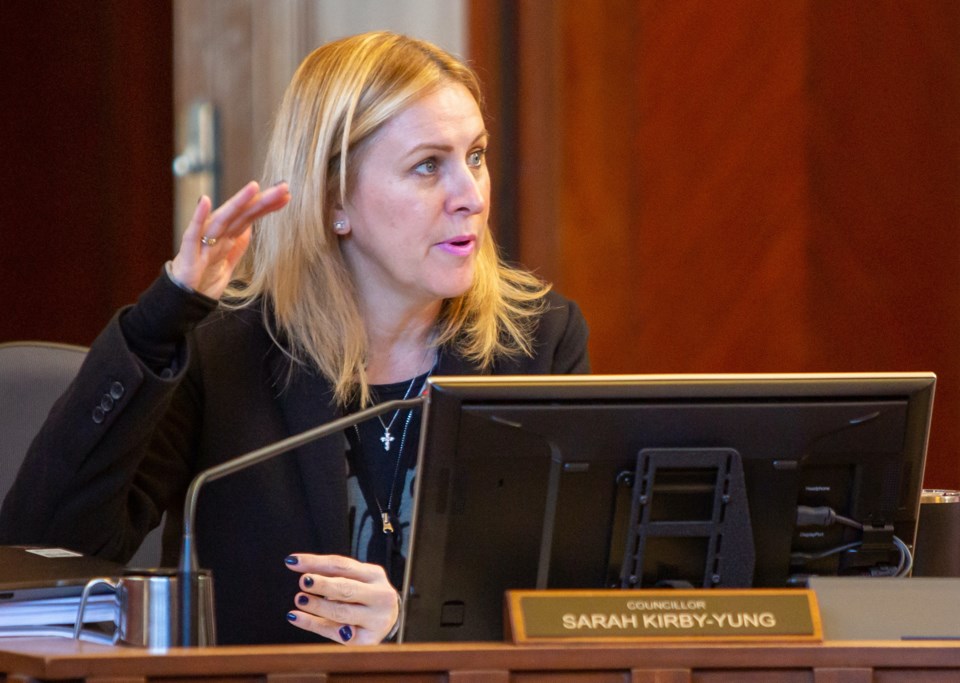
'That's crazy'
ABC Vancouver Coun. Sarah Kirby-Yung said she was shocked to learn that Burnaby only has 200 supportive housing units.
“That’s crazy,” she said, agreeing that the provincial government has a bigger role to play in spreading out supportive housing across the region. “Supportive housing is typically not something that any city or municipality can afford on its own.”
Kirby-Yung cautioned that supportive housing should not be conflated with social housing, which Vancouver will continue to build. By definition, supportive housing is meant to provide tenants with access to life-skills training, medical, addictions and mental health care.
Social housing is subsidized housing.
“Having a temporary modular housing building or having something that simply has an inhalation room [for smoking drugs] is not supportive in terms of providing the services that help stabilize people, get them better and get them to recovery,” she said.
Sim’s announcement comes the same week that BIV reported that crime continues to fall in Vancouver. The mayor mentioned the continuing trend in his speech, but said crimes fuelled by drug addiction and mental illness such as random attacks on citizens and an increase in violent shoplifters remain concerns.
Kirby-Yung echoed those concerns.
“We hear a lot of stories from local retailers in the downtown core, Gastown, etcetera, where people are coming in, trying to take goods and they're bringing weapons with them and holding them up,” she said. “The consequences of that are pretty significant and pretty scary.”
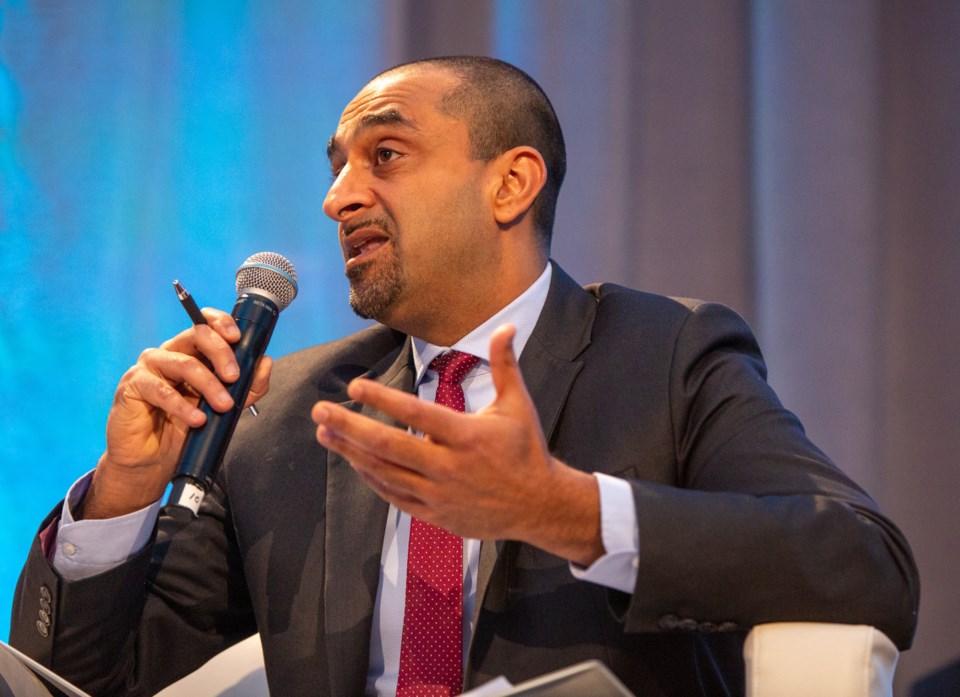
'Makes our communities less safe'
Housing Minister Ravi Kahlon, who is also responsible for municipal affairs, said in an email Friday that he looked forward to meeting with Sim to learn more about his statements.
“My understanding is that the mayor’s argument is that he wants to see other communities building more supportive housing, too,” Kahlon said.
“I’m sympathetic to that, but the simple truth is that if we don’t get housing built, that means more people living on the street or in encampments. That doesn’t work for anyone, and it makes our communities less safe.”
Added Kahlon: “Everyone has to do their part to build the homes people need across the region — and we’re working with communities to build the homes people need. We’re going to keep building housing in communities across B.C. to get people inside and access the supports they need to stabilize their lives.”
Kahlon is the same minister that set housing targets for Vancouver and other municipalities to meet by 2028. The five-year target for Vancouver to build supportive housing units is 583. A recent housing report from the city indicates none were built between Oct. 1, 2023, and Sept. 30, 2024.
'Way more complex'
Green Party Coun. Pete Fry, who is council’s lone non-ABC councillor, said connecting supportive housing to crime and public disorder is misleading when considering the overall tenant base.
“That also includes housing for people with disabilities and senior citizens,” Fry said. “It's way more complex than what they're trying to position it as — that all supportive housing is these SROs.”
He believes the plan to stop construction of supportive housing, amending the Downtown Eastside plan to allow more housing options and recently removing certain view cones in the city will lead to more development along the East Hastings corridor.
“With that trifecta, there is an incredible amount of benefit to the landowners, many of whom are big supporters of the mayor,” Fry said. “This Downtown Eastside area plan rethink will mean more heights and less below market housing and obviously even less supportive housing. A lot of this is incoherent.”
Apartment bans in Vancouver
Abundant Housing Vancouver, a volunteer housing advocacy organization, issued a news release Thursday, saying the organization was “shocked and disappointed” by Sim’s call to halt new construction of supportive housing.
Building less supportive housing will result in more homelessness, and will not force other municipalities to build more of the housing stock, said the organization, which included a quote from director Danny Oleksiuk.
“Ken Sim and ABC have made almost no efforts to reform Vancouver’s deeply exclusionary land use policies,” Oleksiuk said. “Apartments remain banned in neighbourhoods like Shaughnessy, West Point Grey and Dunbar.”
If the mayor really wanted to solve Vancouver’s housing crisis, he would legalize housing across the city, he said, emphasizing the solution to homelessness is homes.
“Instead, Mayor Sim wants to raise more barriers to housing,” he said. “We need to make it easier to build housing, not harder.”
X/@Howellings
